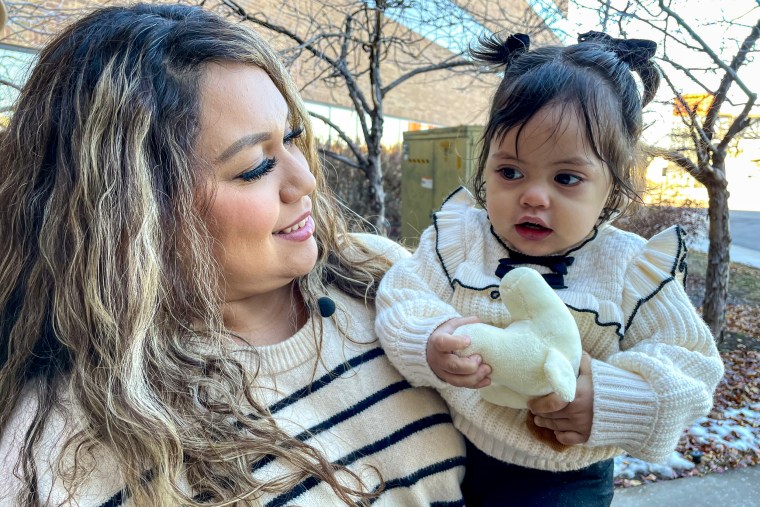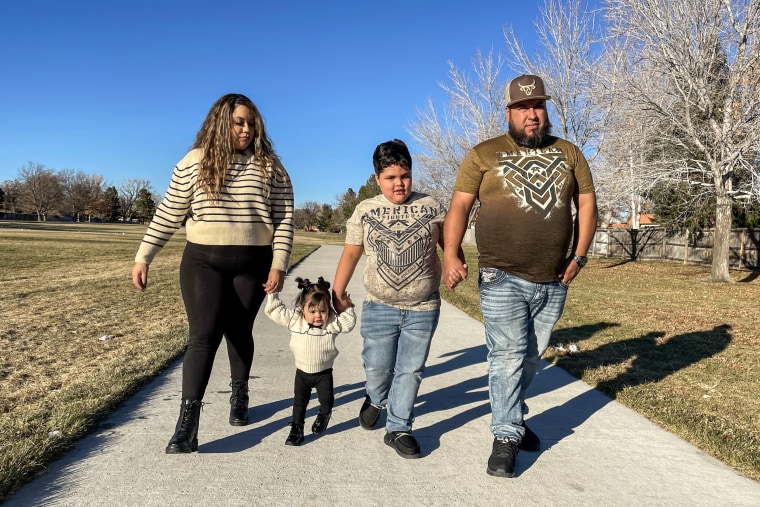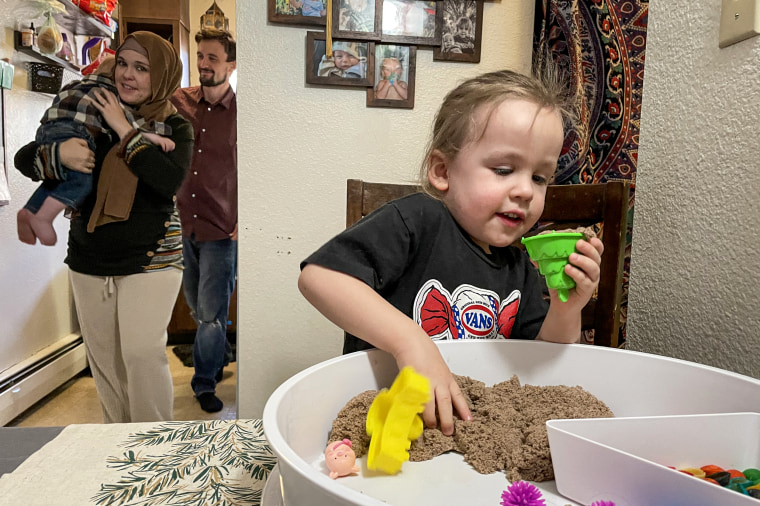AURORA, Colo. — Isabella Quintana’s first birthday came with an unwelcome gift this summer: she abruptly lost her health insurance weeks later.
The little girl, who has a heart murmur and complications after a bad bout of bronchitis, had been covered by Medicaid, the government program insuring low-income and disabled Americans. But over the summer, she was dropped from the program due to what her parents believe is a paperwork issue.
“It’s hard for us because we are always thinking, ‘When she’s going to get sick?’ That’s something that we don’t have control over,” said her father, Gorman Quintana.
In the months since, one of Isabella’s bronchitis follow-up appointments cost about $1,100 — a big chunk of the roughly $35,000 the Colorado family makes per year. When she later spiked a 100.4-degree fever, her parents waited longer than they otherwise would have to take her to the emergency room, hoping it would go down on its own.
“It’s tough, because you want them to be healthy right away, you know? You don’t want to wait until something else happens, you know?” Quintana said.

It’s been five months, and Isabella's parents say she still hasn’t gotten her Medicaid back even though her brother — same family, same income — never lost his.
“It doesn’t make any sense,” said Dr. Laura Luzietti, the executive director of Every Child Pediatrics, where Isabella receives primary care. “It says that something didn’t go the way that it’s supposed to go.”
The Quintanas’ experience with Medicaid isn’t uncommon, Luzietti said.
“We have a lot of families who have the exact same story, and when they ask the enrollment specialists, they’re told that, ‘You’re right. This doesn’t make sense. she should have her Medicaid restored. It’s just going to be a few months.’ But a few months without coverage is a huge deal to these young kids.”

Isabella appears to have been caught up in the rocky aftermath of one of the biggest shake-ups in Medicaid’s 60-year history.
When the Covid public health emergency was ending, the federal government required states to re-evaluate every Medicaid recipient’s eligibility. More than 25 million people lost coverage during the “unwinding” of Medicaid— the majority for procedural reasons like paperwork issues, according to the health policy research group KFF.
In March 2023, almost 40 million children were enrolled in either Medicaid or the Children’s Health Insurance Program. As of this August, more than 5 million fewer children were enrolled in the program, according to the Georgetown Center for Children and Families. It’s not clear how many of those who lost coverage are still eligible.
“some of them undoubtedly made their way to other kinds of coverage,” said Joan Alker, the executive director of the Georgetown center. “But many of them probably did not, because most of them remained eligible for Medicaid, and that’s really where they should be.”
Alker, who has tracked children’s insurance coverage for decades, said she was anticipating that unwinding would hit children hard.
“And it panned out that way,” she said. “But what surprised me was how different it ended up depending on where a child lived.”
some states, like Kentucky, North Carolina and Washington state, did “a very good job of protecting children during the process,” she said. But other states — Texas, Utah, Colorado and Florida — saw large numbers of children lose their Medicaid coverage.
In many places, the exodus created a paperwork backlog. so while unwinding largely ended in the spring, kids like Isabella are still facing the consequences.
“That’s heartbreaking,” said Kim Bimestefer, the executive director of Colorado’s Department of Health Care Policy and Financing, which oversees the state’s Medicaid program. “Everybody deserves coverage. And, you know, we need to get — wherever we can — bureaucracy out of the way.”
Bimestefer says it shouldn’t take four months for coverage to be restored after a paperwork mishap.
“If that happens,” she said, “there’s something wrong. some individuals will fall through the cracks, and we are working really hard, and have been working really hard to find them and get them reconnected.”
In Colorado, unwinding sent safety net enrollment plummeting more than 30%. More than 550,000 people lost their safety net insurance coverage, nearly 150,000 of them children, according to Bimestefer’s office.
A third of Coloradans who lost Medicaid got their coverage restored, according to the state. Others shifted to employer-based insurance when the economy improved after the pandemic.
But Bimestefer acknowledges the state’s uninsured rate has gone up since the unwinding.
“It is an absolute problem,” she said. “Every American should have health insurance. But the bottom line is, when you’re coming off Medicaid and you have no premiums, no deductibles and no copays, and then you go back to reality, that reality can often be very difficult for families to be able to handle and to afford. so yes, there is an increase in the uninsured rate. And yes, Colorado is working every angle to try to get people connected to the coverage that they qualify for.”
Bimestefer says the state created a new way to escalate reviews and is expanding automation to make a dent in the backlog.
But change is not coming fast enough for many families. At Every Child Pediatrics, Luzietti says around 7,000 of her patients lost Medicaid, and the percentage of uninsured patients seeking treatment at her clinics grew from 8% to 15% during the unwinding. she estimates that many others are probably avoiding care entirely because they’re worried about the bill.
“We know a lot of our patients without insurance aren’t wanting to come in unless they really need something. A lot of them are not getting their preventative care, their immunizations. They’re falling behind on things like developmental screenings,” she said. “We could miss an opportunity to intervene early and get kids speech therapy, occupational therapy, what they need to help achieve those milestones. And it really does change their developmental trajectory longer term.”
That’s exactly what’s been worrying Desiree Wines, whose 3-year-old son Jibreel has autism, communication issues and sensory processing disorder. When he suddenly lost his Medicaid insurance last January, the in-home speech and occupational therapies he received through Medicaid were canceled.
“It was very sudden,” Wines said. “They didn’t warn me in any way, shape or form.”
Wines says Jibreel’s coverage was restored about five months later, but the fallout has been long-lasting.

Wines had spent more than a year applying through Medicaid for a special safety bed to help him sleep and keep him from wandering outside. But just before it was about to ship, Jibreel’s Medicaid was canceled, and so was the bed. For months, Desiree was forced to work through the application process again. When the bed finally arrived in mid-December, Medicaid no longer covered a crucial tech hub to keep him safe. so she still sleeps on a mattress on Jibreel’s floor to prevent him from wandering at night.
“He could very well walk out the door. He just doesn’t have any awareness of dangers,” Wines said.
NBC News pressed the Biden administration on why the federal government hasn’t done more to ensure states protect eligible families during the unwinding process. Medicaid is funded by the federal and state governments, which both played a role in unwinding — with states executing the redeterminations and the federal government providing oversight.
“I would say to the parents and the families and the people that you’ve spoken with, those are really difficult stories to hear. No parent, no family should have to go through that,” said Dan Tsai, the Biden administration’s Medicaid director. “There are situations we’ve looked at where the state has made a mistake, and we say, ‘You need to go fix that. You need to cover all medical bills, everything that’s happened.’ But I would say, irrespective of that, something in the system is broken with the amount of red tape or how challenging it is for a parent, a family, an individual who’s still eligible to be able to navigate through that process.”
Tsai said each state has wide latitude in how it runs its Medicaid program — including how much it chooses to invest in simplifying its eligibility processes, the technology used for verification checks and how well it staffs call centers. state decisions have led to drastically different outcomes.
“There are clear laws around what the federal government is able to require of states,” Tsai said. “The biggest stick, which we used in every one of those instances where we intervened, is to say, ‘If you don’t stop, pause, fix and reinstate people, there’s going to be a substantial financial penalty.’ Federal dollars. And we said that every single time.”
some advocates wonder if even bigger Medicaid coverage losses are in store when President-elect Donald Trump takes office. The last time he was in the White House, he repeatedly tried to scale back Medicaid.
But Trump recently told NBC’s Kristen Welker in a “Meet the Press” exclusive that entitlement programs will be off the table for cuts this time around. “I won’t do it,” he said.
Meanwhile, health care providers say the legacy of unwinding may not fully come into focus for years.
“We have huge problems with chronic illness in adults that are costing the system a lot of money,” Luzietti said. “Cutting care for kids, the preventative care that they need to grow into healthy adults, is just about the worst way to make that problem better.”
More immediately, kids like Isabella and Jibreel are already dealing with the fallout.
Isabella’s parents are still waiting for her coverage to be restored five months later, holding their breath that another health crisis doesn’t strike.
Even once children get their benefits back, problems don’t disappear right away. Jibreel went more than five months without speech therapy when his Medicaid coverage was canceled. Now his Medicaid has been restored, his mom said, but he’s still on a waiting list to get back to therapy.
